Key takeaways:
- CRM software centralizes customer information, improving engagement and fostering stronger relationships.
- Automation features enhance productivity by reducing routine tasks, allowing focus on strategic initiatives.
- Data accuracy and reliable customer support are crucial for maximizing CRM effectiveness and user adoption.
- Analytics capabilities provide valuable insights that can transform decision-making and drive business growth.
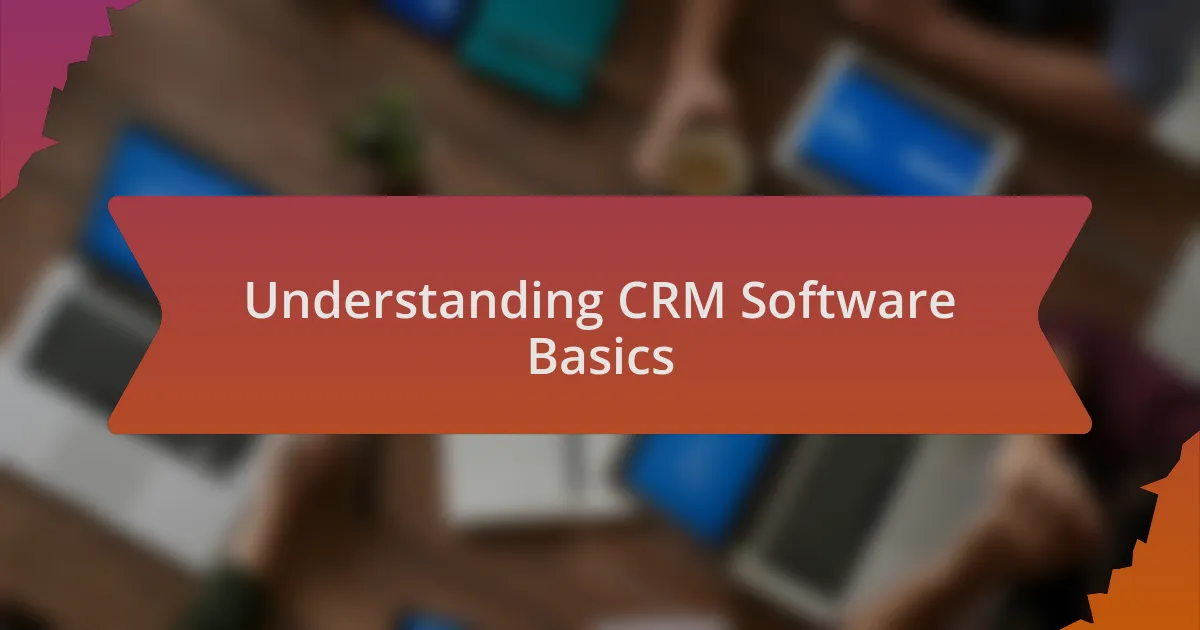
Understanding CRM Software Basics
CRM software, or Customer Relationship Management software, is designed to streamline interactions with customers. I remember the first time I tried a CRM tool; it felt like opening a treasure chest filled with valuable customer insights. Suddenly, organizing contacts, tracking lead interactions, and managing follow-ups became less of a chore and more of an engaging process.
One fundamental aspect of CRM software is its ability to centralize customer information. Imagine having every interaction, purchase, and preference at your fingertips. I’ve experienced the relief of having a complete view of my customers, which not only improves personal interactions but fosters stronger relationships. Have you ever felt overwhelmed by scattered information? With CRM, that anxiety dissipates as you gain clarity and direction.
Moreover, the automation features within CRM systems can transform the way businesses operate. During my trials, I discovered how automating routine tasks made more time for strategic thinking. Isn’t it amazing how something as simple as scheduled reminders can significantly boost productivity? Engaging with CRM software not only improved my workflow but also ignited a passion for efficiency that I didn’t realize I had.

Importance of CRM in Business
The importance of CRM in business cannot be overstated. In my experience, having a comprehensive view of customer data has been a game changer. It allows businesses to not just react but anticipate customer needs, transforming casual interactions into meaningful engagements. Have you ever noticed how a personalized message can make a customer feel valued? That’s the power of CRM in action.
What struck me during my trials was the way CRM systems facilitate collaboration across teams. When everyone has access to the same customer insights, it creates a cohesive approach to service and support. This alignment fosters a sense of unity within the team, making it easier to share successes and learn from failures. Isn’t it rewarding to know everyone is working towards the same goal, driven by shared information?
Furthermore, CRM tools can significantly enhance customer retention rates. I’ve seen how implementing a system that tracks customer interactions and feedback leads to insights on how to improve service. This kind of proactive approach not only keeps customers happy but also cultivates loyalty. Wouldn’t you agree that creating a loyal customer base is essential for long-term success? In my view, investing in CRM is an investment in lasting relationships.
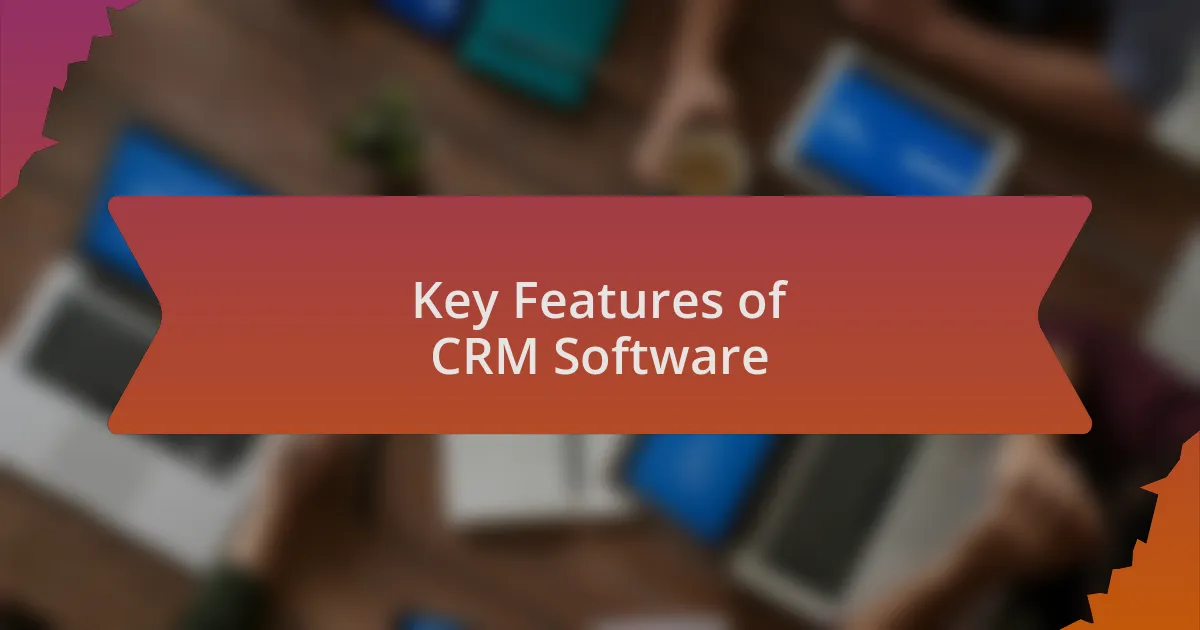
Key Features of CRM Software
Key features of CRM software can truly transform how businesses operate. One standout feature I’ve come to appreciate is the automation of repetitive tasks. During my trials with different systems, I found myself amazed at how automating follow-ups transformed my workload. Instead of spending hours sending emails, I could focus on strategy and building relationships—a freeing experience, wouldn’t you say?
Another essential feature is the robust analytics capabilities that come with most CRM platforms. By diving into customer data, I realized I could identify trends and patterns that I wouldn’t have noticed otherwise. For instance, I discovered that certain clients preferred late-afternoon calls, which made my outreach more effective. Can you imagine the advantage that gives you in terms of expanding your customer relationships?
Lastly, integration with other tools is a crucial aspect that I believe can’t be overlooked. In my experience, seamless integration with platforms like email marketing systems and project management tools has made a significant difference. When everything flows together, it creates a unified workspace that boosts efficiency. Have you ever had a disjointed experience between tools? Consolidating everything into one CRM made collaboration and communication feel effortless for me.
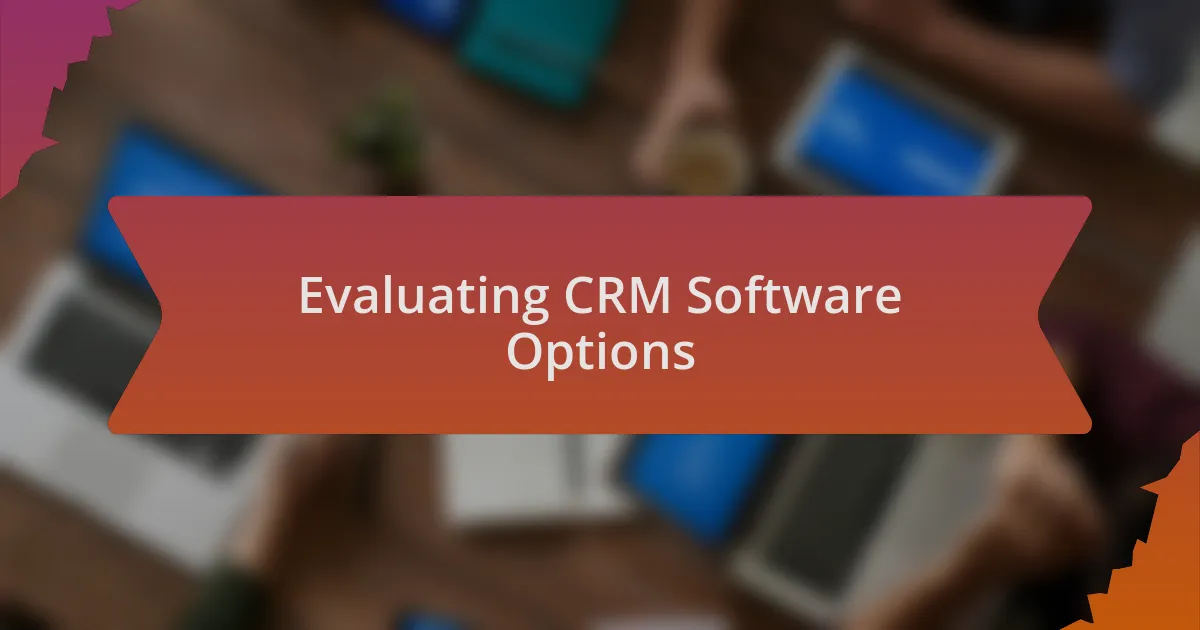
Evaluating CRM Software Options
Evaluating CRM software options can sometimes feel overwhelming, especially with so many choices available. During my trials, I learned that prioritizing user experience is vital. If a CRM is difficult to navigate, it can hinder adoption among team members. Have you ever tried using a tool that was so complex that it made you question its benefits? I certainly have, and it reinforced the importance of an intuitive interface.
Another aspect I found crucial in evaluating options is the scalability of the software. I once selected a CRM that suited my needs at the moment, but as my business grew, I quickly realized it couldn’t keep up. This taught me that it’s essential to choose a system that not only meets current requirements but can also adapt to future growth. Wouldn’t it be frustrating to outgrow your technology just when things start taking off?
Lastly, pricing is always a factor to consider, but it’s essential to look beyond the initial costs. I remember being drawn to a seemingly affordable CRM, only to find that the additional features I needed were only available in pricier tiers. Balancing features with budget is a common challenge. Have you faced that dilemma? I certainly had my fair share of sticker shock, which reminded me that a thorough evaluation should take into account both immediate and long-term value.
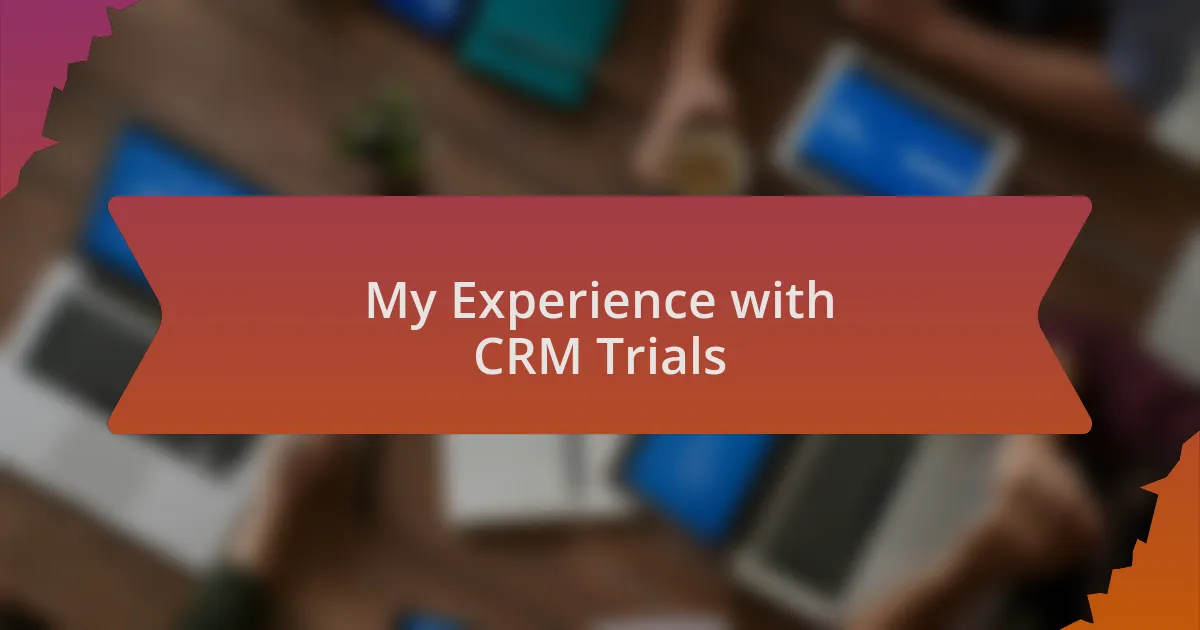
My Experience with CRM Trials
Through my CRM trials, I quickly learned that the integration with existing tools could make or break the experience. For instance, I once tested a CRM that promised seamless integration with my email platform, only to find myself spending hours on troubleshooting instead. Have you ever felt that frustration of lost productivity? It was a stark reminder that compatibility with current systems is as crucial as the features themselves.
During these trials, customer support emerged as a significant factor in my decision-making process. I recall one evening when I faced a critical issue just before a big client meeting. The support team was responsive and helpful, and that reassurance made all the difference. It’s moments like these that highlight the importance of choosing a CRM with reliable customer service—after all, when you’re in the trenches, every second counts.
Another surprising discovery was the value of customization options. I initially overlooked this feature, thinking a standard setup would suffice. However, after customizing a dashboard to better fit my workflow, I noticed a marked increase in my team’s productivity. It’s an interesting realization; how often do we underestimate the power of personalization in software? This experience reinforced my belief that tailored solutions can significantly enhance user engagement and satisfaction.
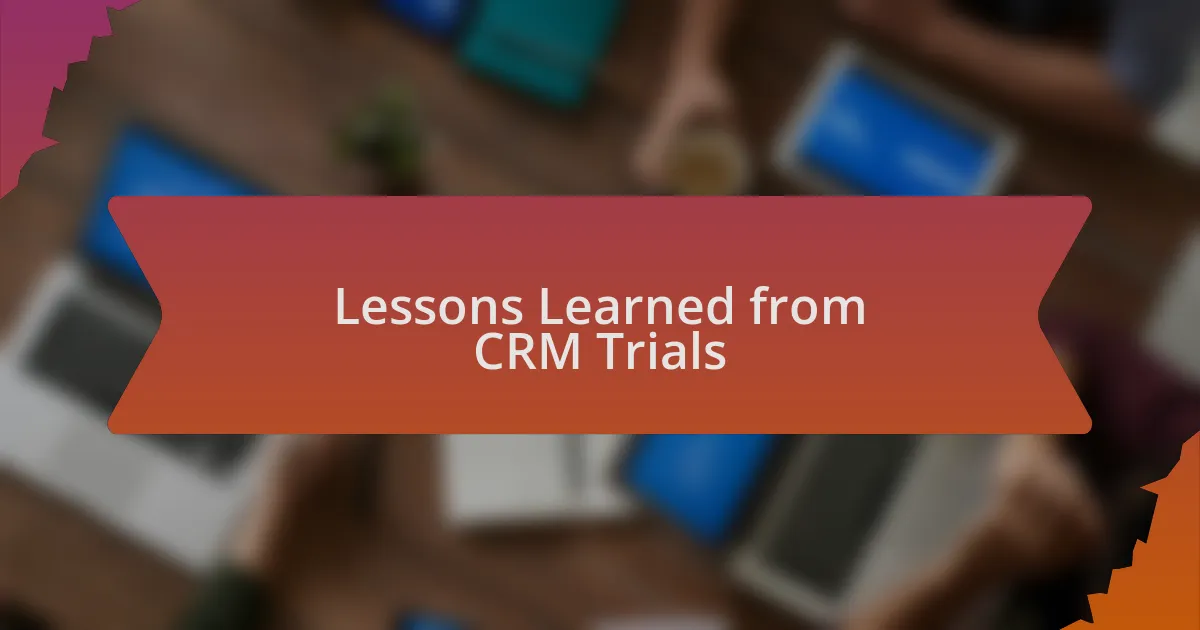
Lessons Learned from CRM Trials
Understanding user adoption played a pivotal role in my CRM trials. I vividly recall a day when my team was hesitant to embrace a new CRM, fearing it would disrupt their established routines. Have you ever faced pushback when introducing new technology? By involving them in the setup process and considering their feedback, I realized that fostering ownership can smooth the transition. It was an eye-opener, illustrating that a tool is only as effective as the people using it.
The importance of data accuracy became glaringly evident as I navigated through different CRM systems. One trial saw me importing customer lists only to discover discrepancies that could have led to miscommunication. It struck me how vital it is to maintain clean and accurate data. How can we build meaningful relationships with clients if our information is flawed? This realization reaffirmed that continuous data management is crucial in leveraging CRM to its full potential.
Lastly, I learned that the true strength of a CRM lies in its analytics capabilities. During one trial, I was surprised by the insights I could gather from sales data that I had previously overlooked. I found myself pondering, how often do we miss out on opportunities because we don’t dive deep into the metrics? That experience highlighted how harnessing data can transform decision-making processes, ultimately driving growth and enhancing customer relationships.